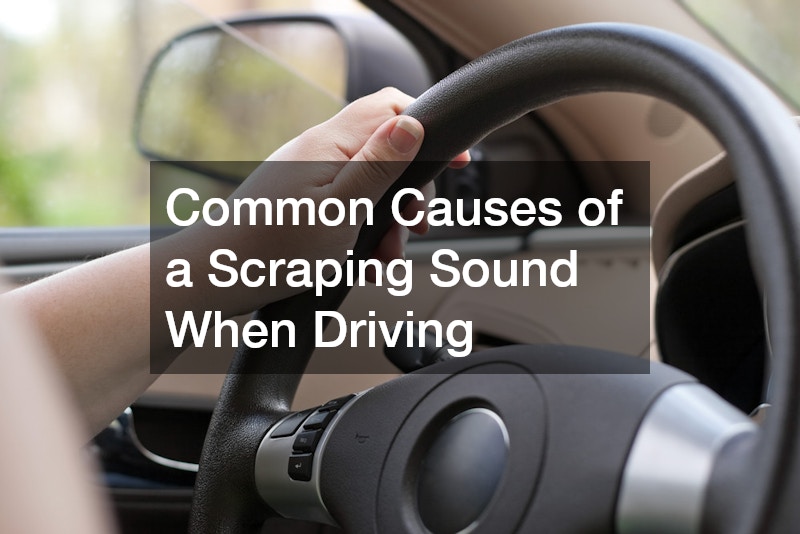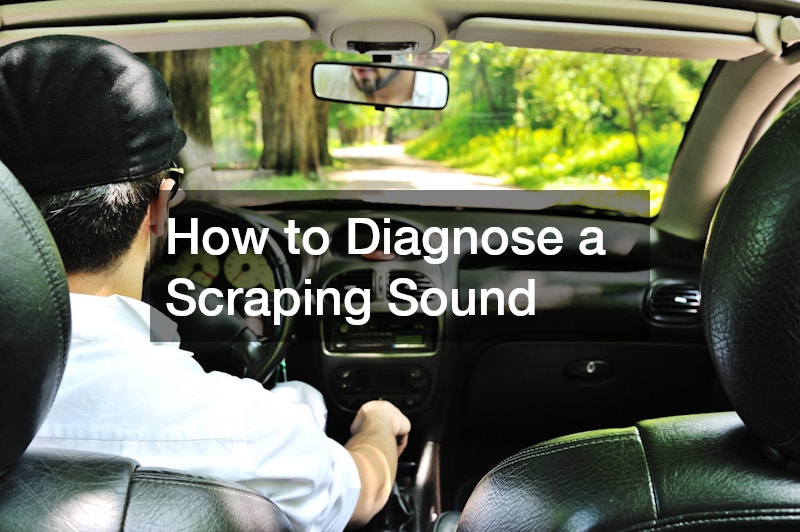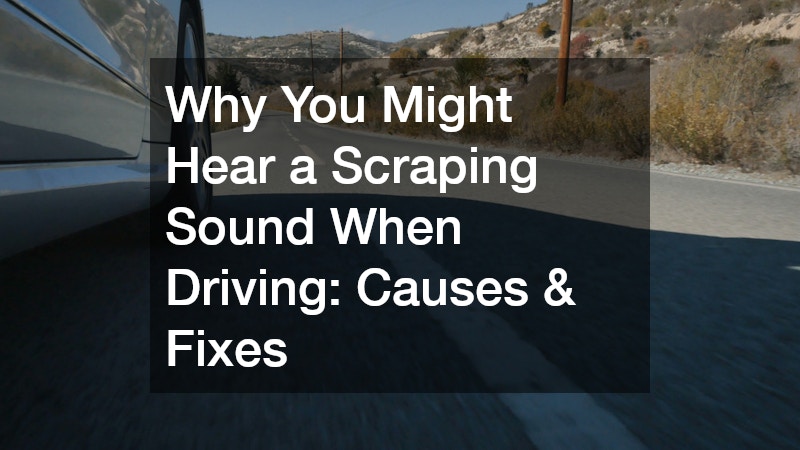Hearing a strange noise while driving is enough to make any driver nervous, especially if it’s a scraping sound. Unlike a light rattle or squeak, scraping often signals that something is physically rubbing, grinding, or dragging against another part of your vehicle. Ignoring this sound can lead to bigger and more expensive problems down the road.
This article will walk you through the most common reasons you might hear a scraping sound when driving, how to diagnose the issue, the dangers of ignoring it, and the steps you can take to fix the problem. Whether you’re an experienced DIY car enthusiast or someone who prefers the help of a mechanic, this guide will help you understand what’s happening under your vehicle.
Common Causes of a Scraping Sound When Driving

There are several possible reasons you might hear scraping while your vehicle is in motion. Some are minor and easy to fix, while others are serious safety concerns.
1. Worn Brake Pads
One of the most common culprits is worn-out brake pads. Over time, the pads wear down until the metal backing plate rubs against the brake rotor. This not only causes a scraping or grinding sound but also reduces braking performance.
Signs of worn brake pads:
- Scraping sound when braking or slowing down
- Longer stopping distances
- Brake warning light on the dashboard
- Vibration or pulsation in the brake pedal
2. Rust or Debris on the Rotors
If your car has been sitting for a while, rust can form on the brake rotors. When you start driving again, the rust may cause a scraping noise until it wears off. Similarly, small rocks, dirt, or road debris can get lodged between the rotor and the brake pad, leading to a constant scraping sound.
3. Loose or Damaged Wheel Shields
Many vehicles have a thin metal shield behind the brake rotors called a dust shield. If it becomes bent, loose, or damaged, it can scrape against the rotor or wheel, making a metallic noise that increases with speed.
4. Worn Suspension or Steering Parts
Sometimes, scraping noises don’t come from the brakes at all. Worn ball joints, control arms, or other suspension components can shift and cause metal parts to rub together, especially when turning or going over bumps.
5. Low-Quality or Damaged Brake Parts
If you recently replaced your brakes with low-quality pads or rotors, they may cause abnormal noises. Poorly fitted parts or warped rotors can create scraping sounds even when the brakes are not applied.
6. Foreign Objects Trapped Under the Vehicle
Something as simple as a plastic bag, stick, or other debris caught under your car can drag on the road surface and make a scraping sound. Checking under the car can quickly rule this out.
How to Diagnose a Scraping Sound

While a mechanic can give you a professional diagnosis, there are a few things you can check yourself.
- Listen carefully – Does the noise happen only when braking, accelerating, or turning?
- Check intensity – A faint scrape may indicate rust, while a loud grinding usually points to worn pads.
- Look for other symptoms – Are you feeling vibrations, pulling to one side, or seeing warning lights?
- Inspect the brakes – If comfortable, remove the wheel to check for worn pads, damaged rotors, or stuck debris.
- Check under the car – Look for anything dragging on the ground or rubbing against moving parts.
If you’re unsure, it’s always safest to have a professional mechanic take a look.
Dangers of Ignoring a Scraping Sound
Some drivers hope the noise will go away on its own, but this is rarely the case. Ignoring a scraping sound when driving can lead to:
- Severely worn or damaged brake rotors
- Reduced braking ability and increased stopping distances
- Higher risk of accidents due to brake failure
- Costly repairs that could have been avoided
- Safety hazards for you and other drivers
In extreme cases, the brakes may fail completely. If you hear a scraping sound when braking or while driving, it’s best to address the issue right away.
Quick Fixes vs. Professional Repairs
Depending on the cause, fixing the scraping sound can be simple or complex.
Possible quick fixes:
- Removing small debris stuck near the brakes
- Cleaning rust from the rotors by driving gently and braking normally
- Bending back a dust shield that’s touching the rotor
When to seek professional repairs:
- Brake pads or rotors need replacement
- Suspension components are worn or damaged
- Noise continues after basic inspection and cleaning
A professional mechanic has the tools and experience to diagnose the problem accurately and prevent further damage.
Preventing Scraping Sounds in the Future
Regular maintenance is the best way to avoid hearing strange noises while driving. Here are some tips:
- Check brakes regularly – Inspect pads and rotors during routine service.
- Replace parts on time – Don’t wait until pads are completely worn down.
- Keep your car clean – Wash away dirt, road salt, and debris to prevent buildup.
- Listen for early signs – Address small noises before they become bigger issues.
- Use quality parts – Invest in reliable brake pads and rotors for long-term performance.
When It’s Safe to Drive and When It’s Not
Not every scraping sound means your car is immediately unsafe, but knowing the difference can help you avoid bigger problems. Some noises are minor and temporary, while others signal urgent issues that should never be ignored.
Safe to drive briefly: If the sound is light and goes away quickly, you may be able to keep driving until you can get it checked. Examples include:
- Surface rust on brake rotors – Common if your car has been sitting for a while. This usually wears off after a few stops.
- Small debris caught in the brakes – Sometimes a pebble or dirt causes a temporary scrape that disappears after driving.
- Splash shields or underbody panels – If they’re just lightly touching, the noise may be minor but should still be inspected soon.
Not safe to drive: If the scraping sound is more severe, continuing to drive can be dangerous. Signs include:
- Loud, constant scraping or grinding – May indicate worn brake pads or metal-on-metal contact.
- Reduced braking power – If the car takes longer to stop, the braking system may be failing.
- Vibrations in the pedal or steering wheel – Could mean warped rotors, uneven wear, or suspension issues.
- Warning lights on the dashboard – Brake or ABS lights mean your system needs immediate attention.
When in doubt, it’s always better to be cautious. A quick inspection by a mechanic can prevent costly damage and ensure your car remains safe to drive.
Conclusion
A scraping sound when driving is not something you should ignore. While the cause may be as simple as a small piece of debris, it could also indicate worn brakes, damaged rotors, or suspension issues that put your safety at risk. By paying attention to when and how the noise occurs, inspecting the brakes, and seeking professional help when needed, you can prevent costly repairs and stay safe on the road.
If you hear a scraping sound when braking or while driving, don’t wait—take action immediately. Your safety and your car’s performance depend on it.

